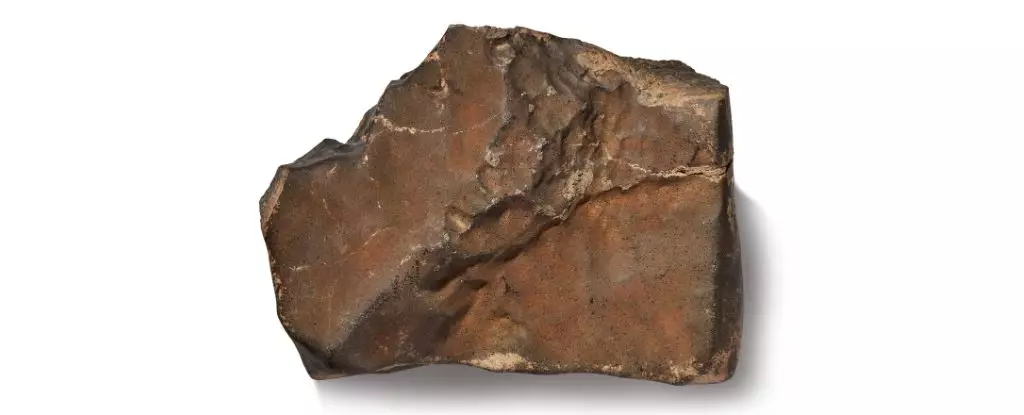A massive slice of Martian history has recently changed hands in a high-profile auction, highlighting an intense debate about the commodification of space-born artifacts. The meteorite NWA-16788, weighing nearly 25 kilograms, fetched an astonishing $5.3 million at Sotheby’s, shattering previous records and elevating the conversation about whether such extraterrestrial treasures should be treated as mere commodities or preserved for humanity’s collective knowledge. This sale is not simply about a rare object changing owner; it underscores fundamental questions about our approach to science, cultural heritage, and the ethics of monetizing what could be considered the most universal of discoveries.
This meteorite’s pristine condition, almost untouched by Earth’s corrosive elements, made it appealing to collectors eager for a tangible piece of Mars. Its origins, confirmed by scientific analysis, trace back to the planet’s volcanic past, providing researchers with invaluable insights into planetary formation and extraterrestrial geology. Yet, despite its scientific value, the price tag too often reduces such scientific marvels to assets of trivial monetary worth. While the buyer remains anonymous, the implications of this transaction ripple beyond individual greed, touching on how society values—and sometimes undervalues—our shared cosmic heritage.
Science Versus Commerce: A Ticking Ethical Time Bomb
The scientific community is divided—some decry the privatization of a scientifically significant object, warning that its transfer into private hands diminishes the collective benefit of research. Critics argue that such rare finds should belong to humanity, held in public institutions where they can educate and inspire future generations. Beyond the immediate monetary gain, the real tragedy lies in the potential loss of data and context once a piece of Mars becomes a trophy in a private collection, inaccessible to scientists who could deepen our understanding of the universe.
Conversely, proponents highlight the reality of scientific funding constraints. They suggest that relinquishing ownership to private collectors could fund future missions or discoveries—arguing that the scientific utility of the meteorite might still be maximized if the new owner is committed to research. However, this perspective often veers into the dangerous territory of commodifying knowledge, risking a future where access to critical scientific resources is dictated by wealth rather than collective progress.
There’s also the moral question surrounding the act of selling a celestial object in the first place. Should planetary materials be commodified just because they have commercial appeal? Is it ethical to turn a planet’s geological history into a luxury item, accessible only to the privileged? This discourse touches on deeper societal values—do we prioritize scientific enlightenment and shared heritage, or are we succumbing to the allure of wealth and status?
The Cost of Cosmic Curiosity in a Capitalist World
What this sale exposes is a broader societal trend: the increasing normalization of treating scientific artifacts as collectibles rather than treasures meant for shared human curiosity. The fact that this Martian meteorite, with its relatively recent Earth fall, was auctioned in an exclusive setting raises questions about who controls our extraterrestrial heritage. When a piece of another world becomes a commodity rather than a resource for scientific advancement, we risk losing sight of why space exploration exists—to expand our collective knowledge, foster inspiration, and promote peace through discovery.
At the heart of this dilemma is the acknowledgment that capitalism often clashes with scientific ethics. While private investment has undeniably driven technological progress and funding for space exploration, it also reinforces inequalities that threaten to privatize knowledge that should belong to all. The danger is that only the wealthiest will have access to the universe’s secrets, turning space into a playground of the elite rather than a open domain of humanity’s shared future.
Perhaps what is most troubling is that these private transactions subtly shift our cultural narrative. Instead of viewing space as an extension of human civilization, it increasingly becomes a battleground for wealth accumulation. The allure of owning a Martian artifact risks transforming our understanding of the cosmos into a status symbol—further marginalizing the scientific community and the public it serves.
In the end, the sale of NWA-16788 isn’t just a story about a rare rock; it’s a mirror reflecting societal priorities. Will we choose to prioritize scientific progress and shared heritage, or will we allow the pursuit of profit to distort our cosmic perspective? If the latter predominates, we risk sacrificing the very curiosity that has propelled humanity to look beyond its borders and reach for the stars in the first place.


Leave a Reply